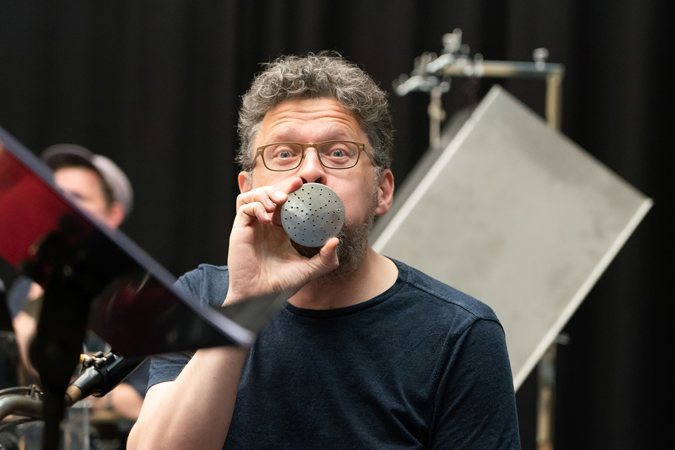“Is that really a clarinet?” (Stephanie Bunbury, The Age, 13 July 1994)
“…not just a clarinet—even in a solo work, a single note … there is an ensemble playing” (Zsusanna Soboslay Moore, RealTime, December 1998/January 1999)

Carl Rosman specialises in performance of the most demanding works of the recent solo clarinet repertoire, and in collaborative creation of new works drawing on and developing his distinctive repertoire of specialised instrumental techniques.
Composers from around the world have found themselves drawn to his polyphony of technique, sound and idea, many composing solo works specifically for him, including Georges Aperghis (Damespiel), Richard Barrett (interference, the world long ago ceased to exist), Aaron Cassidy (The wreck of former boundaries, 27. Juni 2009), Chris Dench (ruins within), Milica Djordjević (treperenje), Michael Finnissy (Kölner Klarinette), Evan Johnson (‘indolentiae ars’, a medium to be kept), Liza Lim (Microbiome), Bethan Morgan-Williams (Gêmdisyn), Rebecca Saunders (Caerulean), and many others, enlarging not only the clarinet’s repertoire but its vocabulary.
Other close collaborators have included Brian Ferneyhough, whose works for solo clarinet, especially Time and Motion Study I for solo bass clarinet and La Chute d’Icare for solo clarinet and ensemble, he has performed widely, as well as Mauricio Kagel and Sir Harrison Birtwistle. He was awarded the Kranichsteiner Musikpreis at the 1994 Darmstadt Ferienkurse.
His praxis as a soloist is informed by a particularly wide experience performing on historical instruments: in chalumeau repertoire by Telemann and Graupner; in new works exploiting the potential of such instruments as the Classical basset clarinet, the Baroque clarinet, and the basson de chalumeau; and in twentieth-century repertoire by Messiaen, Boulez, or Lachenmann, where his instrumental choices cast new light on well-known material, just as they re-establish fading knowledge of original performance practice. Recent appearances as soloist with orchestra include Chaya Czernowin’s Fast Darkness II with the Estonian National Symphony Orchestra under Enno Poppe, and Turgut Erçetin’s Das Phonem zwischen zwei Wörtern (b) with the SWR Symphonieorchester under Brad Lubman.
As clarinettist, he has been a member of ELISION for over thirty years and Ensemble Musikfabrik for over twenty. He also performs as a vocalist (Pierrot lunaire at the 2018 Koper Biennale, Peter Maxwell Davies’ Eight Songs for a Mad King, Kassandra/Athena in Xenakis’ Oresteïa at the 2011 Wiener Festwochen, staged by La Fura dels Baus) and conductor (including with Ensemble Musikfabrik, ELISION and libra ensemble in works ranging from Berg and Varèse through Messiaen, Boulez and Kagel to Ferneyhough, Poppe and Lim, at festivals including the Adelaide Festival, BIFEM, HCMF and the Berliner Festspiele.)
He has recorded widely both as a soloist and with ensemble. Recent releases include Alberto Posadas’ Sombras cycle with Quatuor Diotima and Sarah Maria Sun on naïve, the solo CD Caerulean on HCR, and the 2023 HCR release indolentiae ars devoted to solo works for voice and clarinet by Evan Johnson. Ensemble Musikfabrik’s CD Sprechgesänge, including his performance of Georges Aperghis’s clarinet concerto Babil, was awarded an ECHO Klassik prize in 2011.
“A thwack and a howl and Barrett’s CD begins with the startling Interference, written for clarinettist Carl Rosman. It’s almost two minutes before a clarinet is heard, though, as a literally kicking and screaming Rosman thumps pedal bass drum and sings in a terrifying falsetto (and occasional basso profundo). This opening salvo is one of the most immediately arresting passages in recent composition, and the piece – and Rosman – miraculously maintains this intensity throughout…” Tim Rutherford-Johnson, Musical Pointers
You might also like to have a look here, or here.
Carl Rosman
Copyright © 2009-2024 Carl Rosman. All images are copyrighted by their respective authors.
